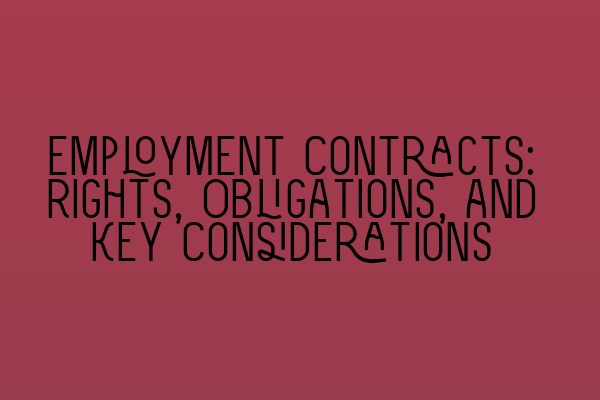Employment Contracts: Rights, Obligations, and Key Considerations
Welcome to the SQE Contract Law blog! In today’s post, we will be delving into the topic of employment contracts. Whether you are an employer or an employee, understanding the rights, obligations, and key considerations of employment contracts is vital for a harmonious working relationship. So, let’s dive right in!
What is an Employment Contract?
An employment contract is a legally binding agreement between an employer and an employee. It outlines the terms and conditions of employment, including rights, responsibilities, and obligations.
In the United Kingdom, employment contracts can be written, verbal, or implied. However, it is highly recommended for contracts to be in writing to provide clarity and avoid misunderstandings.
Rights of Employees
Employees have various rights protected by law. These rights include:
- Statutory Minimum Wage: Every worker in the UK is entitled to be paid at least the National Minimum Wage or the National Living Wage, depending on their age and employment status.
- Working Time Regulations: These regulations set limits on working hours, minimum rest breaks, and annual leave entitlement.
- Protection against Unfair Dismissal: Employees with at least two years of continuous employment have protection against unfair dismissal. However, there are certain exceptions and fair reasons for dismissal.
- Protection against Discrimination: It is illegal to discriminate against employees or job applicants on the grounds of age, disability, gender, race, religion, or sexual orientation.
- Maternity/Paternity Rights: Employees have the right to take maternity, paternity, or adoption leave, along with entitlement to certain benefits during this period.
These are just a few examples of the rights employees enjoy in the UK. Employers must ensure they comply with relevant legislation and provide fair treatment to their employees.
Obligations of Employers
Employers also have specific obligations towards their employees. Some of these obligations include:
- Health and Safety: Employers must provide a safe and healthy working environment and ensure necessary precautions are taken to prevent accidents or harm to employees.
- Pay and Benefits: Employers must pay employees the agreed-upon salary or wage and provide any other benefits outlined in the employment contract.
- Equal Opportunities: Employers must not discriminate against employees and should promote equality and diversity within the workplace.
- Reasonable Notice: Employers must provide employees with reasonable notice before making any significant changes to their terms and conditions of employment.
- Respectful Treatment: Employers should treat their employees with respect and dignity, fostering a positive work environment.
These obligations ensure that employees are treated fairly and maintain a healthy work-life balance.
Key Considerations for Employment Contracts
When entering into an employment contract, both employers and employees should consider the following key factors:
- Terms and Conditions: Clearly define the terms and conditions of employment, including working hours, remuneration, holiday entitlement, notice periods, and any other relevant provisions.
- Duration: Specify whether the employment contract is for a fixed term or ongoing. This will impact the rights, obligations, and termination conditions for both parties.
- Probationary Period: If applicable, outline the duration and conditions of any probationary period for new employees.
- Confidentiality and Intellectual Property: Clearly state the obligations of employees regarding confidentiality and intellectual property rights.
- Dispute Resolution: Include provisions for resolving disputes, such as through mediation or arbitration, to avoid costly legal battles.
By considering these key factors, employers and employees can create a clear and comprehensive employment contract that protects their respective rights and promotes a healthy working relationship.
In conclusion, employment contracts form the foundation of the employer-employee relationship, providing clarity and protection for both parties. Employers must fulfill their obligations, and employees must understand and assert their rights.
For more information on legal topics and career guidance, check out our related articles:
- Barrister vs. Solicitor: A Comprehensive Comparison
- Exploring Different Solicitor Specializations: Finding Your Niche
- Embracing the Rise of Virtual Law Practices
- Unveiling Real-Life Case Studies: Insights into Legal Practice and Decision-Making
- Exploring Solicitor Salaries in the UK: Average Earnings and Factors Affecting Income
We hope this article has provided valuable insights into employment contracts. If you need legal advice or assistance with employment matters, SQE Contract Law is here to help. Contact us today for expert guidance.
